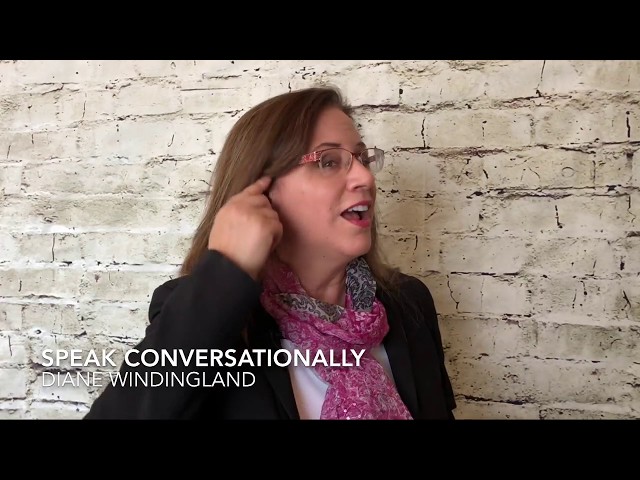You don’t want to sound robotic. You don’t want to sound scripted.
The video above (3:21) gives you some tips on speaking conversationally, which is one of many skills you will practice in my online course, No Fear Public Speaking.
Below is the transcript of the video, which was transcribed (for only $0.40!) using TEMI (minor edits).
Have you ever tried to memorize a speech?
How did that go? When I’ve done it, it has not gone well. I’ve tried it a couple of times and either I blanked out in the middle because I’d gotten myself into a rut and didn’t have another path, or I sounded stilted because I was trying to remember exactly what I wanted to say. I’ve even seen people who’ve memorized a speech, who’ve done it visually. They’ll use their eyes like they’re reading their speech. You don’t want to be that person, so what are some ways that you can sound conversational when you speak?
Well, number one is, if you need notes, and there’s nothing wrong with having a few notes, use an outline or keyword notes just to keep yourself on track and don’t try to memorize things word for word with the possible exception of maybe the opening couple of sentences and your concluding couple of sentences, but other than that, internalize, don’t memorize.
Another way you can sound more conversational is when you write your speech or practice it, write and practice the way you speak. Write for the ear. What I mean, is to not use things like full words when a contraction would be the more natural way to speak. For example, I might write, “I do not believe that is true.” However, that’s not normally how I would speak. I’d usually use contractions. I’d use “don’t” and “that”: “I don’t believe that’s true,” or I might even shorten it, “That’s not true,” to be how I speak. Then you can also use pausing, like when you ask a rhetorical question, as I did at the beginning of the video when I said, “Have you ever tried to memorize a speech?”
I paused for a couple of seconds as if we were in conversation and even though you didn’t answer me out loud, I gave you space to answer in your head. Another way to sound conversational is to look at a particular person. Use eye contact when you’re speaking. Then you can also use words that sound like you’re speaking to one person. Now, I could have said at the opening of this video, “Have any of you ever tried to memorize a speech?” Note the phrase, “Have any of you . . . ?” I’m not speaking to just one person. If I want to make it sound more personal, I won’t say, “Have any of you . . . ? I will simply say, “Have you . . . ?” . . . “Have you ever tried to memorize a speech?”
Take these tips and sound more conversational.
Learn to be a Confident Speaker! Take Diane’s Online Course, No Fear Public Speaking: Look, Sound and Feel Confident!

